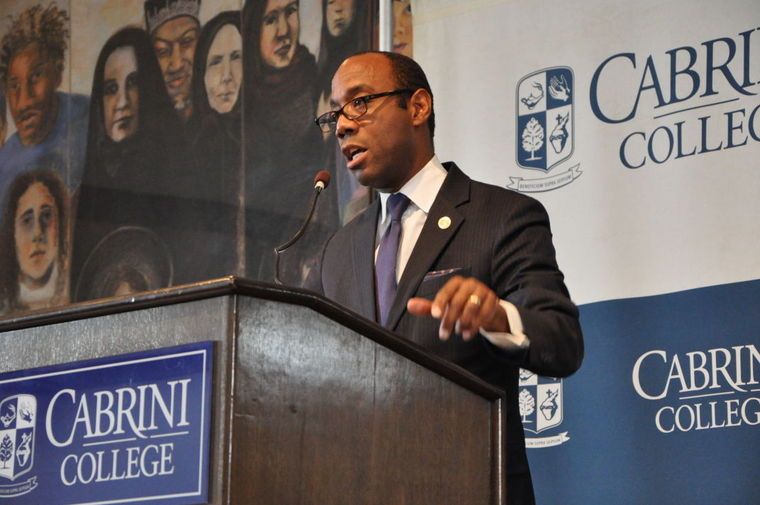There can be no progress without struggle, the president and CEO of the National Association for the Advancement of Colored People said during this year’s executive in residence keynote address.
“We have to struggle in order to bring about progress,” Cornell Brooks, president and CEO of the NAACP, said. “We can’t give in, we can’t give up, we can’t give over, we have to stand against injustice day in and day out and we have to write our own history.”
This year’s Nerney Leadership Institute’s executive in residence brought Brooks to campus on Thursday, April 9 for a day-long residency, also coinciding with the student diversity office’s Unity Week. His keynote address in Grace Hall delved deep into civil rights in America, entitled “Civil Rights in America: From Ferguson to Selma, Captors or Creators of History.”
Dr. Jeffrey Gingerich, interim provost and vice president of academic affairs, began the keynote address with the poem “Harlem (A Dream Deferred)” by Langston Hughes, relating it to the how the NAACP works on dreams. “First they work to ensure that as many dreams as possible can blossom and flourish so that they do not need to be deferred,” Gingerich said.
“But the NAACP is also there when those dreams that have been deferred by injustice, by racism, by fear, do explode. They are there in moments of crisis and confusion to make sense and to renew the dream and to replant the dream.”
Introducing Brooks to the 200-person crowd was associate professor and chair of history and political Science Dr. Darryl Mace. Mace discussed the work Brooks has done throughout his life and its connection to the social justice curriculum and outreach of Cabrini. “We must face difficult issues and sustain dialogue if we are going to effect change,” Mace said.
Taking the podium, Brooks commenced his speech by addressing the crowd as his colleagues. He then began his speech with juxtaposing past and present American history, specifically 50 years since the civil rights movement.
He started off by talking about the Edmund Pettus Bridge as well as the Shelby v. Holder Supreme Court decision, both dealing with voting rights. “We’re mindful as we sit on this bucolic campus, at this particular moment in our American history, that we are literally at a crossroads of hope and history, contemporary circumstances and challenges,” Brooks said.
Brooks then addressed the possibility of being on the precipice of a third Reconstruction. Describing the first Reconstruction during the 1860s and 1870s as being on the “horizon of hope,” while the second Reconstruction during the 1950s and 1960s came face to face with segregation and putting an end to separate but equal. “For every act of justice, there seems to be an equal and opposite act of injustice.”
He also painted a picture of activists who have created change over the years and the work that the NAACP does to continue that change. With a thundering, preacher-like deliverance, Brooks stressed the importance of having the confidence to step up and be persistent in the fight for social change. “You can’t tweet social change,” he said. “You gotta show up to bring about social change.”
Taking action was a main theme throughout Brooks’ speech. Relating back to the title of his presentation, he asked the question as to whether or not we will be co-creators of history or captors of history. He questioned the audience as to whether they would act out the credo and mission of Cabrini and making social justice real.
“If history is any indication, we will rise up and we will be co-creators of our own history. We will take the pen of history and write a new conclusion, write the tale of a third Reconstruction. Why? Because we are well able to do that,” Brooks said.
Pointing out how the fights of the NAACP have changed over the years, he said that a major push of their work is to end profiling, in whatever way it manifests itself, whether it be race, ethnicity, religion or sexual orientation.
Brooks also examined the work that the NAACP does in regards to protecting the right to vote and specifically referencing the issues with the Voting Rights Act. He also said another key issue that the NAACP works on is the issue of educational disparities, citing the issue of the preschool to prison pipeline. Brooks stated the importance of taking a stance on zero tolerance policies, changing regulations and pushing for equitable financing. “If we believe that creativity, brilliance, imagination, energy and initiative are equally distributed irrespective of race, ethnicity, hue, heritage or zipcode, then we have to finance the schools on that basis,” Brooks said.
In much the same way as he described how the NAACP works vigilantly to create change, he also said how important it is for college students to stand up and lend their voice. He sees college, specifically Cabrini’s social justice mission, as an opportunity to catalyze change and advocate for social change. “If you have courage now, if you have guts now, if you have moral imagination now, you can change the world now and give the future,” Brooks said.
“We have to stand up. Stand up for the right to vote, stand up for income equality, stand up for justice, stand up for reform in the criminal justice system, stand up for the principles and the precepts; stand up for justice in our midst–justice today, justice now and being creators of history.”



